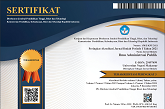The Role of Organizational Ethical Culture Moderating the Influence of Leadership Style and the Effectiveness of Internal Control System Implementation on Government Employee Performance
(1) Universitas Airlangga
(2) Faculty of Economics and Business, Airlangga University, Indonesia
(3) Faculty of Economics and Business, Airlangga University, Indonesia
(*) Corresponding Author
DOI: https://doi.org/10.26858/jiap.v13i2.57829
Abstract
This research aim to investigate the influence of leadership style and the effectiveness of the control system on the performance of government employees, while considering organizational ethical culture as a moderating variable. Quantitative approach, causal associative, path analysis model to assess variable relationships. The primary objective is to discern the direct and indirect effects of independent variables (exogenous) on the dependent variable (endogenous). Data analyzed using Partial Least Squares (PLS) with SMART PLS software, including outer and inner model testing. Research finds organizational ethical culture significantly influences and moderates leadership style's influence on employee performance. Leadership style, internal control system effectiveness don't significantly influence employee performance. Organizational ethical culture doesn't moderate this influence significantly.
Keywords
Full Text:
PDFReferences
Alamanda, S., Setiawan, M., & Irawanto, D. W. (2022). Leadership Styles On Employee Performance With Work Satisfaction And Organizational Commitment As Intervening Variables. Jurnal Aplikasi Manajemen, 20(1), 34–42. https://doi.org/10.21776/ub.jam.2022.020.01.04
AlFlayyeh, S., & Alghamdi, A. B. M. (2023). Leadership Styles and its Impact on Employee Performance: An empirical investigation of Riyadh Private Hospitals. Journal of Population Therapeutics and Clinical Pharmacology, 30(15). https://doi.org/10.47750/jptcp.2023.30.15.003
Andreani, F., & Petrik, A. (2016). Employee Performance as The Impact of Transformational Leadership And Job Satisfaction in PT Anugerah Baru Denpasar. Jurnal Manahemen Dan Kewirausahaan, 18(1), 25–32. https://doi.org/10.9744/jmk.18.1.25-32
Apriliawati, N. K., & Suardana, K. A. (2016). Budaya Etis Organisasi Sebagai Variabel Pemoderasi Pengaruh Orientasi Etis Pada Pertimbangan Etis Auditor. E Jurnal Akuntansi Universitas Udayana, 17(2), 1226–1253.
Brian, O. :, & Manansal, F. (n.d.). Kinerja Pegawai Di Sekertariat Dprd Kota Bitung.
Dewi, P. P., & Mastra. I Made. (2016). Pengaruh Budaya Etis Organisasi dan Pemahaman Good Governance pada Kinerja Auditor Kantor Akuntan Publik di Bali. Jurnal Ilmiah Akuntansi Dan Bisnis, 1(1).
Fitri Eka Sulistyowati. (2014). Hubungan Antara Budaya Organisasi Dengan Organizational Citizenship Behaviour (Ocb) Pada Pegawai Dinas Pendidikan Kota Cilegon. Eprints.Ums.Ac.Id.
Ginting, P., & Situmorang, S. H. (2008). Filsafat Ilmu dan Metode Riset. USU Press Art Design, Publishing & Printing . https://www.researchgate.net/publication/315652846
Hu, L. T., & Bentler, P. M. (1999). Cutoff criteria for fit indexes in covariance structure analysis: Conventional criteria versus new alternatives. Structural Equation Modeling: A Multidisciplinary Journal, 6(1), 1-55.
Hair, J. F., Sarstedt, M., Hopkins, L., & Kuppelwieser, V. G. (2014). Partial least squares structural equation modeling (PLS-SEM): An emerging tool in business research. In European Business Review (Vol. 26, Issue 2, pp. 106–121). Emerald Group Publishing Ltd. https://doi.org/10.1108/EBR-10-2013-0128
Hunt, S. D., Wood, V. R., & Chonko, L. B. (1989). Corporate Ethical Values and Organizational Commitment in Marketing. Journal of Marketing, 53(3), 79–90.
Kustiani, L. (2021). Peran Gaya Kepemimpinan, Budaya Organisasi dan Reward Terhadap Komitmen Kerja Karyawan. JBMI (Jurnal Bisnis, Manajemen, Dan Informatika), 18(1), 19–33. https://doi.org/10.26487/jbmi.v18i1.13180
Marlina, L., Maifizar, A., Rahmadani, I., Maulina, R., Rahmazaniati, L., Husen, T. I., & Zulkarnain, M. (2021). The Role of Mediating Leadership Morality on the Influence of Organizational Culture on the Internal Control System. Advances in Social Science, Education, and Humanities Research, 435.
Meyrina, Rr. S. A. (2017). The Implementation of Rewards and Punishment on The Performance of The Employees within The Ministry of Law and Human Rights. Jurnal Ilmiah Kebijakan Hukum, 11(2), 139–157.
Newland, S. J. (2012). Organizational Citizenship Behavior- Individual or Organizational Citizenship Behavior- Organization: Does the Underlying Motive Matter? http://digitalcommons.wku.edu/theses/1159
Osei, F., Yankah, R., Agyapong, P. J., & Owusu-Mensah, S. (2022). The effect of corporate governance elements on employee performance: evident form ghanaian banking industry. Jurnal Technium Business and Management, 2(3), 6–22. www.techniumscience.com
Ramadhan, M. I., Nurfadlillah, S. I., Wahyuni, U., Awalia, F., & Dianita, M. (2020). The Effect Of Internal Control Of Employee Performance-Palarch’s. Journal Of Archaeology Of Egypt/Egyptology, 17(4), 3409.
Ringle, C. M., Wende, S., & Becker, J. (2015). PLS-SEM Using SmartPLS 3 Partial Least Squares Structural Equation Modelling (PLS-SEM) Using SmartPLS 3 Instructors. In Information Systems Research, Journal of Business Research, Journal of Leisure Research, Journal of Service Research, Journal of the Academy of Marketing Science. MIS Quarterly. http://www.smartpls.com.
Rozi, A., Tinggi, S., Prima, I. E., & Serang-Banten, G. (2019). The Effect of Leadership and Motivation on Employee Performance at PT Bumi Rajawali in Tangerang. Jurnal Ilmiah Ilmu Administrasi Publik, 9(2), 165–172. http://ojs.unm.ac.id/iap
Sarita, J., & Agustia, D. (2009). Pengaruh Gaya Kepemimpinan Situasional, Motivasi Kerja, Locus of Control Terhadap Kepuasan Kerja dan Prestasi Kerja Auditor. Simposium Nasional Akuntansi Ke-12.
Savitri, C., Faddila, S. P., Iswari, R., Anam, C., Syah, S., Mulyani, R., Sihombing, R., Kismawadi, R., Pujianto, A., Mulyati, A., Astuti, Y., Adinugroho, W. C., Imanuddin, R., Kristia, A., Nuraini, M., & Tirtana, S. (2021). Statistik Multivariat Dalam Riset (I. Ahmaddien, Ed.; 1st ed.). Widina Bhakti Persada. www.penerbitwidina.com
Sudaryati, E., Agustia, D., & Pratama, M. I. (2019). The effect of morality intensity and internal control regarding the accounting fraud tendency. Religacion Revista De Ciencias Sociales Y Humanidades, 4(15), 34–41.
Sudaryati, E., & Mohamed, N. (2017). Enhancing Governance in Indonesian Local Government Through Accrual Accounting: Are We Ready? Advanced Science Letters, 23(8), 7723–7727.
Wijaya, P. H., Widayati, C. C., & Rahmayanti, C. (2018). Pengaruh Gaya Kepemimpinan Situasional, Budaya Organisasi Dan Kompensasi Terhadap Kinerja. Jurnal Ekonomi, XXIII(3), 319–333.
Yanti, R., Fikri, K., Nofirda, F. A., Ekonomi, F., Bisnis, D., & Riau, U. M. (2022). Pengaruh Gaya Kepemimpinan dan Kompetensi Terhadap Kinerja Karyawan di PT. Felousa Trimedika Indonesia (Studi Kasus Pada PT. Felousa Trimedika Indonesia). In Economics, Accounting and Business Journal (Vol. 2, Issue 2).
Article Metrics
Abstract view : 76 times | PDF view : 21 timesRefbacks
- There are currently no refbacks.
Copyright (c) 2024 Erny Anggrahini, Erina Sudaryati, Reyhan Dzikriansyah Sunarno

This work is licensed under a Creative Commons Attribution 4.0 International License.
Diterbitkan oleh:
Program Studi Ilmu Administrasi Publik
Program Pascasarjana Universitas Negeri Makassar
JIAP Index By:

This work is licensed under a Creative Commons Attribution 4.0 International License.









